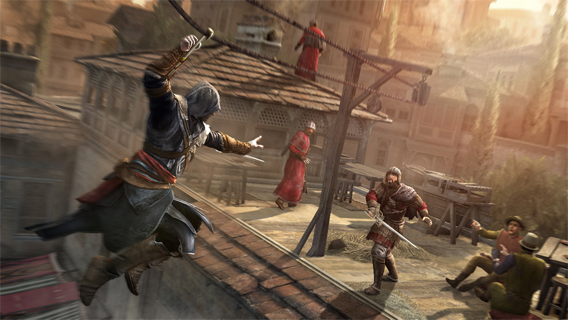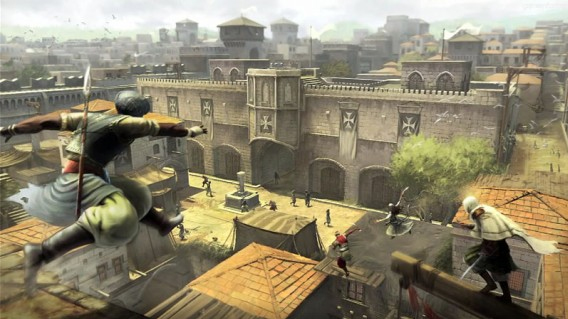
The latest innovations in stab-simulation from stealth-murder industry leader Assassin’s Creed can be had today, with the release of Assassin’s Creed: Revelations. The latest entry in the series sees the aged Ezio Auditore seeking to uncover the secrets of series originator Altair—who appears in a handful of flashback missions throughout the game. Meanwhile, Ezio also battles the Templar armies in Constantinople, and oversees the Assassin guild in that city.
Lording over your Assassin minions is much as it was in Brotherhood, with a few quirks. Assassin’s are recruited in small sidequests and can be deployed at the touch of a button to emerge from the shadows and nail enemy targets.
These disciples see upgrades through combat and can still be sent away on missions to gain experience, but the missions now have more tangible rewards—in that completely freeing a city of templar control yields continuing income and bonuses, much the way renovating shops does.
Additionally, Ezio’s Assassin forces wage a war for control inside Constantinople, whereby Ezio’s captured dens can be contested by Templar forces—resulting in Revelation’s most curious offering: a tower defense mini-game.

This is an interesting step for the series, if not as refined as it needs to be. Winning a battle largely involves stacking a crapload of units on the right rooftop and the liberal application of cannon fire, but I admit some visceral satisfaction in being able to look over Ezio’s shoulder as he commands the army I’ve assembled for him.
These mini-games are technically optional; they can be avoided entirely by keeping a close watch on the Templar awareness meter and keeping it low. This feels like an experiment, and though I wouldn’t describe it as a full success, my interest is piqued, and I’ll look for future entries to refine the formula.
Assassin training culminates in a two part quest whereby the Assassin student will become a master, and his assigned den will become impervious to further attack. An optional but nicely satisfying avenue, the training system lends some resolution and legitimacy to the concept of controlling a league of Assassins, and blends rather organically with the events of the core game.
By contrast, Altair’s side-missions don’t fair quite as well. The earlier Assassin’s interludes should have been played as an opportunity to provide unique missions, but instead are the least engaging of the campaign. Logically, Altair cannot possess the abilities and technology of Ezio, and thus playing as Altair is a more limited experience with a more limited Assassin, and the uninteresting scenario design doesn’t help. Besides the potential to drop a few plot elements, these missions offer little to look forward to.

The title distinguishes itself from its predecessors with a series of curious puzzled-based missions, revolving around the game’s third protagonist, Desmond Miles. These puzzling interludes are a comfortable change of pace, sitting the player down and telling a story during the solving of some simple, organic puzzles—and finally shedding some light on the character of Desmond. These, too, are clearly experimental, and can be avoided if the player chooses—but I wouldn’t recommend it.
It’s the odd little touches like these missions that make it clear Ubisoft is still seeking to make progress in a game that can sometimes feel very “samey.” It’s also worth noting how impressive it is that the game switches between the viewpoints of these three core characters organically, without breaking down the narrative.
Back on Ezio’s side of things, the increasingly aged guild master employs a couple of new tricks. Climbing is sped up by the addition of a hook to extend Ezio’s reach—also providing some combat applications—while a fairly robust bomb-crafting feature provides a wealth of new options for distracting, luring, and engaging guards.
Bombs can be customized for effect, area, and detonation—from timed grenades to trips wires, and smoke bombs to amusing loot grenades that eject fake coins to lure crowds.
Like anything in Assassin’s Creed, bombs are only as satisfying as you make them. Four games into the series, there’s a truly ridiculous number of ways to engage and escape enemies, and you’re unlikely to see all the options at any given time. It’s easy to find a niche, and maybe a little too easy to get comfortable in it; those players who experiment will find themselves the most rewarded. My advice? Try assassinating an enemy while parachuting off a tall building. Not because it’s an especially practical kill, but because this is a videogame, and because you can.
All things considered, the annual schedule appears to be wearing on the franchise somewhat. Brotherhood, despite also being an annual release, was a game-changer that introduced multiplayer and expanded and refined the core gameplay experience in such a way that it was leaps and bounds beyond its predecessors—and against that standard, Revelations doesn’t quite measure up.

That’s not to say Revelations is a poorer game; it isn’t. It’s just not an obviously superior game; it hasn’t taken the steps that say “Yes, I deserve to be here, as a sequel.”
Revelations is comparable in its scope to Brotherhood—expansive on its own, but notably smaller than Assassin’s Creed II. Additionally, though there is a great deal of content to be had, it is mitigated by the fact that much of it is the same basic content as the last two entries. Many concepts and scenarios recur (such as Ezio’s dungeon-crawling interludes), unfortunately creating the sensation that one is playing the same game rather than a sixty-dollar sequel.
Some areas remain ripe for improvement; Revelations still doesn’t always communicate well with the player (critical in a game with so many play options), while the graphics engine is showing its advanced age, and a few bugs and quirks may crop up. At this point in the series, one expects details such as these to be ironed out.

Where revelations picks up the slack is in its multiplayer component. Two years ago I never would have guessed it, but multiplayer has become the purest, most satisfying expression of the core gameplay goals of Assassin’s Creed. It’s where you’ll find the unpredictable, unscripted, and above all, adaptive gameplay that the franchise originally promised, only infinitely better realized by the addition of a human element.
At first glance, multiplayer is fundamentally the same as it was in Brotherhood, with the same careful, intelligent design—but some subtle and deliberate improvements have been made.
New modes are at the forefront of this effort. In addition to a handful of novelty objective game-types, Revelations includes a handful of unique spins on the core “kill or be killed” game mode. Specifically, these modes tune out certain elements of hunt, allowing players to choose a mode tailored to their particular goals. If you feel the target compass or special abilities obfuscate that raw hunt-and-kill imperative, there are game modes to omit those features.
My favorite variation is the assassination mode, where targets are chosen by the player rather than assigned by the computer. With a vague awareness of the positions of other humans, the player can spot, target, and kill anyone on the field—and the real thrill is that the player you’re stalking may also be stalking you. It’s important to be aware of other humans, even if they aren’t tracking you—because if you kill your own target while they lurk nearby, they’re likely to spot and pursue you next.

Regardless of the variant you choose, Revelations will remain a game that rewards patience, cunning, and quality over quantity. There’s nothing so satisfying as rocketing to first place after spending several minutes lurking in a haystack for a perfect, devastating kill. The game is designed to punish impatience and run-and-gun players and reward the careful and deliberate, in a wonderful inversion of multiplayer norms.
For those players who fell in love with multiplayer in Brotherhood, Revelations is an excellent (if subtle) refinement of the formula that may warrant your attention. Meanwhile, those who skipped Brotherhood have even greater reason to give Revelation’s exemplary multiplayer component a try.
On the campaign side, long time series adherents may find that three games set in the same time period (in a series that could instantly redefine its experience by moving to, say, the industrial revolution) has worn on some of the appeal, but Revelations remains a solid entry for those looking for another go ‘round. As for those new to Assassin’s Creed, this entry is easily the most well-rounded in the series and an obvious choice from a gameplay perspective.
Ubisoft Montreal
Publisher
Ubisoft
System
Xbox 360, PlayStation 3, PC (Xbox 360 Reviewed)
Modes
Singleplayer, Online Multiplayer
Release Date
November 15, 2011 (PS3, X360); November 29, 2011 (PC)
*A copy of this title was provided by the publisher for review
